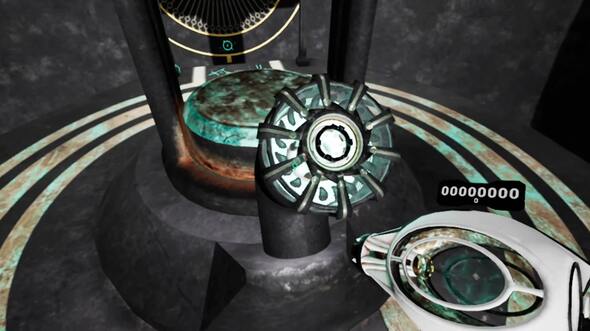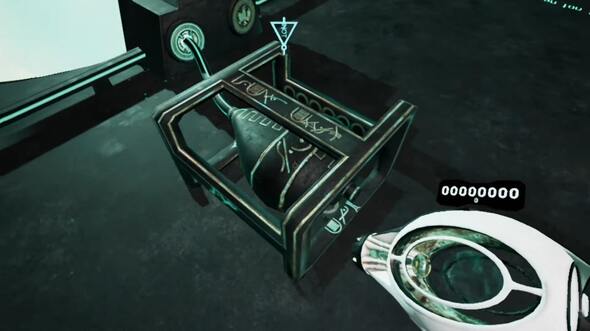
Developer: David Shaw, Inductance, LLC
Publisher: Inductance, LLC
Platform: PC, Switch
Tested on: Switch
The Long Gate – Review
We’re going to start our review for The Long Gate with a bold statement: we didn’t progress all that far into the game, and we *had* to resort to a guide for the proportionally small bit of progress that we made. While we don’t usually shy away from a challenge, developer David Shaw’s first-person puzzle title had us beat. Unless you possess a rather specific set of knowledge and a motivation to take on an incredibly complex puzzle game, chances are that you won’t make it all that far into the game either. We’re not ashamed to admit that The Long Gate is a game that goes beyond our puzzle-solving skills, but is it a challenge you should take on, or is it best left unsolved? Read on to find out.
Story
One of the more notable aspects of The Long Gate is the conspicuous absence of story elements. Although the game is set in a mysterious and seemingly ancient underground facility, which seems like it would be perfect for an expansive, lore-driven adventure, the game eschews narrative elements pretty much entirely. There are no cutscenes or in-game text present to explain anything. Instead, you find yourself as a nameless, faceless protagonist, wandering around in the aforementioned facility. Your only concern is moving forward, presumably towards the exit. There is an air of mystery throughout the game, and the monumental rooms evoke the feeling that history has happened here, but the game doesn’t capitalize on its setting, leaving the player to fill in the blanks instead.
Graphics
We were underwhelmed with how The Long Gate looked on Switch, though we’re not sure whether this is the result of an unoptimized port or simply because that is how the game is supposed to look. Either way, we were confronted with blurry visuals quite often and the dark environments were often difficult to navigate. It’s not that the game is all that taxing on the hardware -or at least it shouldn’t be- because there isn’t all that much detail on screen at any point. That said, we were occasionally impressed with the lighting effects, but this isn’t a game that is going to blow you away with its visuals.
Sound
The Long Gate offers a surprisingly sparse soundscape, relying almost completely on environmental sound effects. To the game’s credit, the absence of music and voice acting actually contributes to the claustrophobic atmosphere. This is a title best enjoyed with headphones on, so that the sounds of your surroundings, combined with the noise you make by interacting with objects, really aid in immersing yourself in this mysterious world.
Gameplay
In The Long Gate, you find yourself in an enormous and mysterious underground facility and you need to find a way out. In order to do this, you’ll need to restore the flow of power. This is done by solving puzzles that -among other things- involve flipping switches, connecting wires, and solving mathematical equations. The main tool you have at your disposal, apart from your own brain, is a strange device that somewhat resembles a Portal Gun, that allows you to interact with objects. Cryptic writing on the wall provides you with vague hints on how to progress, but for the most part, you’re left to your own devices in figuring out the rules of this world. The final goal is of course to bring power to the game’s endpoint. If that description sounds like your cup of tea, then you’ll absolutely adore what’s on offer here. We should point out that The Long Gate is only going to appeal to a niche audience because of how elaborate the puzzles turned out to be.
Full disclosure: the puzzles turned out to be so complicated that we felt like we had no choice but to resort to an online guide. This first-person puzzle title left us scratching our heads more than once. Not because the puzzle designs are overly complicated or obtuse, but because the game strays away from the typical conventions we’ve come to expect from puzzle games and instead requires some out-of-the-box thinking in order to make any progress. This especially applies to the sheer scale of the puzzles, which goes beyond anything we’ve encountered in a puzzle game ever. Several of the puzzles are intricately connected to others, spanning multiple rooms.
It’s an intimidating prospect, and with good reason. If you want to take on The Long Gate and see it through to the end, you’re either going to need a decent understanding of engineering (and binary, for that matter) or take the lazy way out and use a guide whenever you get stuck. You’re able to turn on hints with the “Extra Nudge” difficulty setting, but even if you do so, you’re still stuck with a considerable challenge. This difficulty is by design, and the major hindrance here is that the game relies on the player already being familiar with several of the core concepts, without providing any explanation. Don’t know what 55 is in binary? Well, too bad. Other puzzle games tend to ease the player into how everything works, gradually introducing and explaining new mechanics, but The Long Gate pushes you off the deep end and expects you to be able to swim without any lessons. For a specific type of player, these puzzles, which depend on sheer logic and knowledge of how things work, will be a joy.
If you don’t fit in the particular niche that The Long Gate has set its sights on, however, this isn’t going to be a fun experience. Most of the joy in puzzle games comes from being able to solve the puzzle. Sadly, the specific subset of knowledge required to beat this game is so narrow that most people will feel frustrated with what’s on offer here. Admittedly, the issue isn’t with the puzzles themselves, as these are expertly designed, but the brilliance doesn’t shine through if you can’t solve them.
Once you figure out just how clever the actual puzzles are, you’ll start to appreciate them. It’s a strange sensation, as the general feeling we had during our time with The Long Gate was that we simply weren’t smart enough to beat this game. As it turns out, we weren’t anyway, hence the need for a guide. In all honesty, we couldn’t even begin explaining the puzzles to you, even after having seen the solution to some of them; that’s how complex these are. If you feel like this is a challenge for you after reading this review, then, by all means, give The Long Gate a shot.
Conclusion
There is no middle ground here: you will either love or hate The Long Gate, depending on how well you gel with the puzzles. We were in the latter category, so why the relatively high score if we didn’t have a good time with the game? Quite simple: while the game might not be for us, we can still appreciate what it attempts to be. We may not understand how The Long Gate works, but what we do understand is just how good this game will be for those that feel at home with the logic puzzles the title has to offer. Objectively speaking, The Long Gate isn’t bad as a puzzle game, but it requires a certain compatibility with the player, and that’s probably the biggest challenge the game itself will face with finding its audience.
The Long Gate - Review,









No Comments